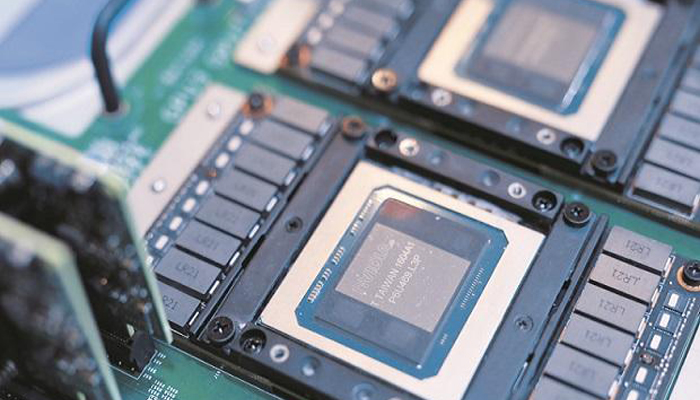Cabinet approves Rs 76,000-cr scheme for semiconductor manufacturing

Rs 76,000 cr approved for development of semiconductors and display manufacturing ecosystem in India; Incentives of Rs 2.3 trn to position India as global hub for electronics manufacturing, says govt
The Union Cabinet on Wednesday approved a production linked incentive (PLI) scheme for semiconductor and display board production in the country, I&B Minister Anurag Thakur said.
The scheme envisages investment of Rs 76,000 crore in semiconductor production over the next 5-6 years, he said.
The programme aims to provide attractive incentive support to companies / consortia that are engaged in Silicon Semiconductor Fabs, Display Fabs, Compound Semiconductors / Silicon Photonics / Sensors (including MEMS) Fabs, Semiconductor Packaging (ATMP / OSAT), Semiconductor Design.
The programme will usher in a new era in electronics manufacturing by providing a globally competitive incentive package to companies in semiconductors and display manufacturing as well as design, said government while adding that semiconductors and displays are the foundation of modern electronics driving the next phase of digital transformation under Industry 4.0.
Telecom and IT Minister Ashwini Vaishnaw said the decision will help design, fabrication, packing and testing of the microchips and develop a complete ecosystem.
Companies including Israel's Tower Semiconductor, Apple's contract manufacturer Foxconn and a Singapore-based consortium have shown interest in setting up semiconductor fabrication units in India, a government source said, while adding that Vedanta Group was also keen to set up a display fabrication plant in India, reported Reuters.
Following broad incentives have been approved for the development of semiconductors and display manufacturing ecosystem in India:
Semiconductor Fabs and Display Fabs: The Scheme for Setting up of Semiconductor Fabs and Display Fabs in India shall extend fiscal support of up to 50% of project cost on pari-passu basis to applicants who are found eligible and have the technology as well as capacity to execute such highly capital intensive and resource incentive projects. Government of India will work closely with the State Governments establish High-Tech Clusters with requisite infrastructure in terms of land, semiconductor grade water, high quality power, logistics and research ecosystem to approve applications for setting up atleasttwo greenfield Semiconductor Fabs and two Display Fabs in the country.
Semi-conductor Laboratory (SCL): Union Cabinet has also approved that Ministry of Electronics and Information Technology will take requisite steps for modernisation and commercialization of Semi-conductor Laboratory (SCL). MeitY will explore the possibility for the Joint Venture of SCL with a commercial fab partner to modernize the brownfield fab facility.
Compound Semiconductors / Silicon Photonics / Sensors (including MEMS) Fabs and Semiconductor ATMP / OSAT Units: The Scheme for Setting up of Compound Semiconductors / Silicon Photonics / Sensors (including MEMS) Fabs and Semiconductor ATMP / OSAT facilities in India shall extend fiscal support of 30% of capital expenditure to approved units. Atleast 15 such units of Compound Semiconductors and Semiconductor Packaging are expected to be established with Government support under this scheme.
Semiconductor Design Companies: The Design Linked Incentive (DLI) Scheme shall extend product design linked incentive of up to 50% of eligible expenditure and product deployment linked incentive of 6% - 4% on net sales for five years. Support will be provided to 100 domestic companies of semiconductor design for Integrated Circuits (ICs), Chipsets, System on Chips (SoCs), Systems & IP Cores and semiconductor linked design and facilitating the growth of not less than 20 such companies which can achieve turnover of more than Rs.1500 crore in the coming five years.
India Semiconductor Mission: In order to drive the long-term strategies for developing a sustainable semiconductors and display ecosystem, a specialised and independent ?India Semiconductor Mission (ISM)? will be set up. The India Semiconductor Mission will be led by global experts in semiconductor and display industry. It will act as the nodal agency for efficient and smooth implementation of the schemes on Semiconductors and Display ecosystem.
Comprehensive fiscal support for semiconductors and electronics
With the approval of the programme for development of semiconductors and display manufacturing ecosystem in India with an outlay of Rs 76,000 crore, Government of India has announced incentives for every part of supply chain including electronic components, sub-assemblies, and finished goods. Incentive support to the tune of Rs 55,392 crore have been approved under PLI for Larges Scale Electronics Manufacturing, PLI for IT Hardware, SPECS Scheme and Modified Electronics Manufacturing Clusters (EMC 2.0) Scheme. In addition, PLI incentives to the quantum of Rs 98,000 crore are approved for allied sectors comprising of ACC battery, auto components, telecom & networking products, solar PV modules and white goods. "In total, Government of India has committed support of Rs 2,30,000 crore to position India as global hub for electronics manufacturing with semiconductors as the foundational building block," said government.
"In the current geopolitical scenario, trusted sources of semiconductors and displays hold strategic importance and are key to the security of critical information infrastructure. The approved program will propel innovation and build domestic capacities to ensure the digital sovereignty of India. It will also create highly skilled employment opportunities to harness the demographic dividend of the country.
"Development of semiconductor and display ecosystem will have a multiplier effect across different sectors of the economy with deeper integration to the global value chain. The program will promote higher domestic value addition in electronics manufacturing and will contribute significantly to achieving a $1 trillion digital economy and a $5 trillion GDP by 2025," said government in a statement.
(Only the headline and picture of this report may have been reworked by the Business Standard staff; the rest of the content is auto-generated from a syndicated feed.)
